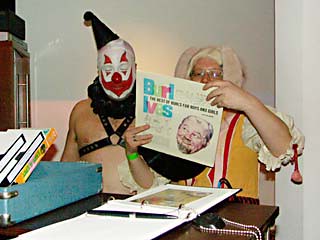age++;Yes, I have completed another year.
Went out today in the hopes of adding more sensors to the robot. While I work on convincing myself to strap a camera to the thing, I'm looking for some low-cost options, like simple light sensors. So what'd I do? I went to electronics stores.
Or so I thought. Fry's had neither photoresistors, nor the connectors I needed. Fry's, the store that drove TechAmerica out of business! RadioShack had photoresistors, but nothing else I needed. (I have no idea what it is RadioShack sells these days. Remote-controlled cars?)
Anyway. I was listening to NPR today for my daily dose of Liberal Bias™, and was reminded of some of the reasons why I'm so frustrated with the "political opposition" in this country.
Once again, Bush delivered a speech justifying our continued presence in Iraq by linking it to the "War on Terror." Why the hell are we still letting him get away with this? Even the daftest of neocons must recognize that Iraq is an
entirely separate issue. Why weren't a dozen senators immediately leaping over themselves to point out this idiocy? Because the Republicans are expected to fall in line behind their party chief, and the Democrats are spineless.
And, of course, criticizing the war effort "emboldens our enemies." I'm tired and frightened of this sentiment. Political opposition and discourse — or what passes for it in this country — emboldens our enemies? Hm...is that because they "hate freedom," and political discourse is one of our fundamental freedoms? Frankly, I think it might cut down on hatred of this country if we could be seen as something other than a unified mass of greedy fundamentalist capitalists. But does the supposed opposition party attack this notion? No. It goes like this:
Realist: "The war, it does not go so well."
Neocon: "Saying that gives power to al Qaeda, like in Highlander, where they suck soul energy out of the decapitated body of the other Immortal."
Realist, now with tail between legs: "I HEART FREEDOM."
Sigh. A more appropriate response would be "Any high school debate class in the country would recognize that as an Appeal to Consequences of a Belief at best, and a strawman at worst." Or, in less civil circles, "Oh, hey, that's the old
ad I'm-a-fucking-idiot argument."
And, of course, the neocons in this country presume to have a monopoly on moral values. Nevermind for the moment that these are the folks that want to tell you who you can marry, that want to abolish the minimum wage and send your job to India, and who count among their ranks formerly-fervent segregationalists. Let's ignore that for the moment, and get to a more topical issue:
When it came to light that the US was torturing inmates in Iraq, running secret prisons and interrogation centers in countries with poor human rights records, and the like, what happened? The neocons, turning their Jesus-powered million-candlepower spotlight of "moral values" onto the issue, immediately banded together as one voice to do
absolutely nucking fothing. No bill condemning the use of torture. Many Republican congressmen came out in
support of the methods, insisting that we could only win our War on Terror if the terrorists couldn't be sure how far we would go in interrogations.
In a word:
No. This is not what we do in this country, and this is not what our anointed representatives do abroad. It is fundamentally contrary to the values on which this country was founded. If the richest, most technologically advanced nation on Earth cannot win a war without electrocuting the genitals of some terrorists, this is a problem.
And I'm sure our overtures to Freedom look pretty fucking anemic in light of this.
Fortunately, in response to the massive anti-torture "Eh" that arose from the right side of the aisle, the Democrats banded together to issue an "Eh" of their own. I have not heard a single member of Congress come forward and plainly state "Torture is wrong, it is not what we do in this country." It would have been an obvious moral crowbar in the 2004 Presidential Election. Sadly, the closest thing I've heard isn't even from the left side: it's from McCain, who has obvious motives for disliking torture. (I gain more respect for that guy every time I hear him talk. If only he weren't such a social conservative.)
It's conditions like this that make me think about going into politics. We've got the Jesus Party, and the Unspecified Platform Party. They're either espousing the ideals of their religion and ideology, or they're not espousing anything in particular. This country needs a good shot of constitutional idealism, right in the arm.
This is a nation founded on freedom, sure, but it's also a nation founded on integrity, free flow of information, personal responsibility, secularism — overall, a nation founded on, and in the pursuit of, human enlightenment. Everyone seems to have forgotten this in their race to cover their cars with flags and ribbons.










